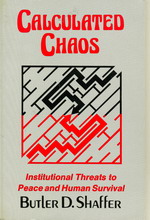
Calculated Chaos
Institutional Threats to Peace and Human Survival
Shaffer, Butler D.
Publisher: Alchemy Books, San Francisco, USA
Year Published: 1985
Pages: 338pp ISBN: 0-931290-89-9
Resource Type: Book
Cx Number: CX8609
Discusses the role of institutions within society and how their interests have lead to conflict and war over the past century.
Abstract:
Calculated Chaos: Institutional Threats to Peace and Human Survival by Butler D. Shaffer discusses the role of institutions within society and how their interests have lead to conflict and war over the past century. The author describes how Western society has become highly institutionalized and placed the needs of large corporations and organizations above the needs of citizens and individuals. Wars have shed the blood of millions and have starved and tortured millions more out of economic or political gain, and institutions have played a central role directing the energy of the people towards futile ends. Shaffer questions the role of institutions in society and believes that "If we can marshal the courage to ask ourselves uncomfortable questions, we may discover how our systematic, organized behaviour has had adverse and often disastrous consequences. We have been taught that institutions are necessary in order to provide for peace, order, and coordination in society; and yet our society is filled with much discord, agony and violence." The theme of Shaffer's book insists "institutions are the principal means by which conflict is produced and managed in society. Peace is incompatible with institutional activity [and] the success of institutions depends upon the creation of those conditions in which personal and social conflict will flourish. "In order to create societies that benefit people and "if we wish to put an end to the organized turmoil and violence in our lives [we] must learn to live and work together without those institutionalized systems that foster conflict."
Shaffer's criticism of institutions is not meant to point fingers and place blame, but rather to gain a better understanding of ourselves and how we function within a highly institutionalized system. His idea of individuals as 'cookie cutter people' speaks clearly to his belief of our stratified society. Shaffer questions whether modern society can organize itself into groups without institutions, politics and hierarchies, where conflict "and all the other trappings of#modern civilizations" can be left out. The author asserts "Institutions corrupt the social needs that cause us to form social organizations, replacing our need for cooperation with systems of control."
Institutions flourish through division and Shaffer's work demonstrates how institutions direct attentions towards specific visions of how society should be instead of directing attention towards solutions to prevent and resolve conflicts. "The book examines not only the organizational needs for conflict, but the psychological origins of our institutional attachments. The revelations are startling, as our attitudes and practices are exposed and analyzed, leading to an understanding of the mechanisms by which our acquiescence in our own victimization has been fostered by the very agencies that claim to protect us."
[Abstract by William Stevenson]
Subject Headings


